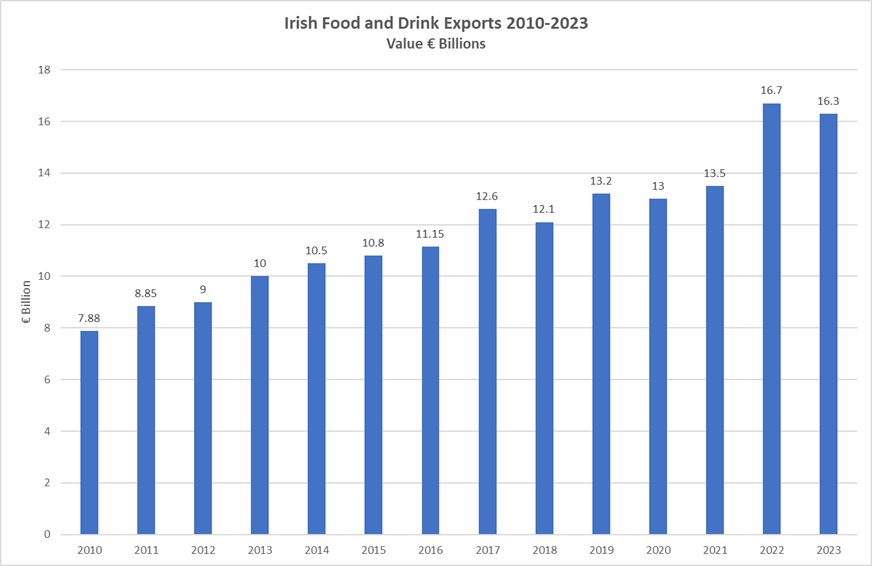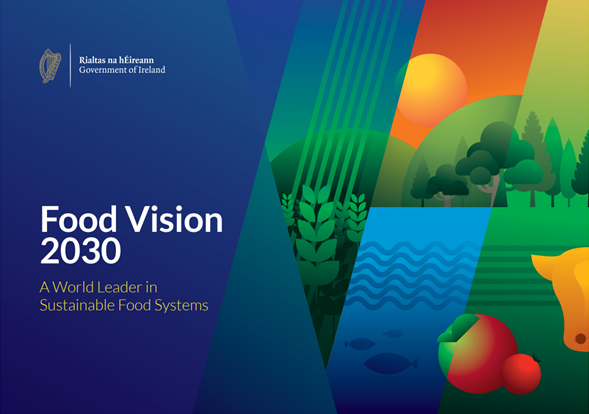
Family-owned farms dominate Irish agriculture. There are more than 135,000 farms, with an average land holding of 33.4 hectares. Pasture-based farm enterprises dominate, thanks to Ireland’s rich green grass growth for 9 to 10 months a year. As a result, Irish output is dominated by dairy and livestock, especially beef. Dairy and beef account for two-thirds of gross agricultural output and similar proportions of agri-food exports.
In 2023:
- Ireland exported €16.3 billion in food, drink and horticulture exports
- Slight decrease of 4% on 2022 when exports grew a record 22%
- Export value still 24% higher than 2019.
- Irish agri-food exported to over 175 countries
- Dairy sector accounts for 40% (€6.3bn) of overall food and drink exports
- Beef exports 489,000 tonnes, down 3%
- However, Ireland continues to be the largest net exporter of Beef in the Northern Hemisphere
- Prepared Consumer Foods exports increased 7% to €3.1 billion
- Butter exports €1.3 billion
- Cheese exports €1.3 Billion
- Beverages exports €1.8 billion
- Irish Whiskey accounted for 49% of beverages exports
- Irish agri-food sector employed over 164,900 people, 6.4% of the total working population
The strategic vision for the agriculture and food sector is set out in a series of 10 year plans, published every five years. In 2021 Food Vision 2030 was published. The overall aim of Food Vision 2030 is for Ireland to become a “World Leader in Sustainable Food Systems” over the next decade, delivering significant benefits for the Irish agri-food sector, for Irish society and the environment. To realise this vision, Food Vision 2030 has adopted four high level missions and 22 goals for the agri-food sector to work towards in the period to 2030. In demonstrating the Irish agri-food sector meets the highest standards of sustainability – economic, environmental, and social – this will also provide the basis for the future competitive advantage of the sector. By adopting an integrated food systems approach, Ireland will seek to become a global leader of innovation for sustainable food and agriculture systems, producing safe, nutritious, and high-value food that tastes great, while protecting and enhancing our natural and cultural resources and contributing to vibrant rural and coastal communities and the national economy.

Other key aspects of Ireland’s agri-food profile:
- Ireland is the world’s first country to implement a national sustainability programme for agriculture and food – Origin Green – which unites government, producers and the private sector on a journey to make Ireland’s food and drink sector the most sustainable in the world.
- As an exporting nation, Ireland’s agri-food sector is export-led and driven by in-depth consumer demand insights from our key export markets.
- The use of technology and innovation is fostered to add value, build competitiveness and to address key challenges of the sector, such as environmental sustainability. For example, Ireland’s national beef genomics programme aims to lower the intensity of GHG emissions by improving the genetic merit of the national beef herd.
- The highest standards of food safety management are in place to protect the health of consumers and ensure Irish food exports are trusted globally. Independent studies, such as – Food Safety News – confirm that Ireland is a world-leader in food safety.


